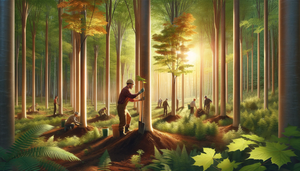Reforestation Projects in Vermont
Jul 11, 2024
The picturesque state of Vermont, with its rolling hills and lush forests, is synonymous with maple syrup production. This cherished artisanal product has long been a staple for breakfast lovers, foodies, and chefs. However, the sustainability of this natural treasure is threatened by deforestation and climate change. Various reforestation projects are underway to combat these challenges and restore degraded maple forests and sugar bushes. These initiatives preserve the traditional methods of maple syrup production and ensure the continued availability of this sweet delight for future generations.
The Importance of Maple Forests
Maple forests, especially the iconic sugar bushes, are the heart and soul of Vermont's maple syrup industry. These forests are vital for syrup production and play a crucial role in maintaining ecological balance. They provide habitats for wildlife, enhance soil quality, and contribute to the environment's overall health. Unfortunately, deforestation, invasive species, and climate change have severely impacted these forests, leading to a decline in maple tree populations.
Key Reforestation Projects in Vermont
- Vermont Family Forests (VFF) Initiative
- Objective: To restore and manage family-owned forests sustainably.
- Activities: Planting native tree species, controlling invasive species, and promoting sustainable forestry practices.
- Impact: Improved forest health, increased biodiversity, and enhanced maple syrup production.
- Green Mountain National Forest Restoration
- Objective: To rehabilitate degraded forest areas within the Green Mountain National Forest.
- Activities: Large-scale tree planting, habitat restoration, and public education programs.
- Impact: Strengthened resilience against climate change, preserved wildlife habitats, and sustained maple syrup production.
- Vermont Land Trust (VLT) Conservation Efforts
- Objective: To protect and restore privately owned forest lands.
- Activities: Conservation easements, reforestation projects, and community engagement.
- Impact: Long-term preservation of forest lands, protection of water resources, and support for local maple syrup producers.
Benefits of Reforestation for Maple Syrup Production
Reforestation projects have numerous benefits for the maple syrup industry:
- Increased Maple Tree Population: More trees mean higher syrup yields and more robust sugar bushes.
- Enhanced Biodiversity: Diverse forests are healthier and more resilient, supporting a more comprehensive range of plant and animal species.
- Climate Change Mitigation: Forests absorb carbon dioxide, helping to reduce the impact of global warming.
- Economic Sustainability: Healthy forests ensure the longevity of the maple syrup industry, providing economic stability for local communities.
How You Can Get Involved
There are several ways you can support reforestation efforts in Vermont:
- Volunteer: Join local reforestation projects to plant trees and help maintain forests.
- Donate: Contribute to organizations dedicated to forest conservation and reforestation.
- Choose Sustainable Products: Support maple syrup producers who practice sustainable forestry.
Vermont's maple syrup is more than just a sweet treat; it symbolizes tradition, quality, and sustainability. Reforestation projects play a crucial role in preserving this heritage by restoring degraded forests and ensuring the health and longevity of sugar bushes. By supporting these initiatives, we can enjoy Vermont maple syrup's rich, wholesome sweetness for generations to come.
FAQs
Q: What is a sugar bush?
A: A sugar bush is a forest stand of sugar maples managed for maple syrup production.
Q: How does reforestation benefit maple syrup production?
A: Reforestation increases the number of maple trees, improves forest health, and enhances biodiversity, leading to higher syrup yields.
Q: Can I volunteer for reforestation projects in Vermont?
A: Many local organizations welcome volunteers for tree planting and forest maintenance activities.
Q: How can I ensure the maple syrup I buy is sustainably produced?
A: Look for certifications or labels indicating sustainable forestry practices and support local producers who prioritize environmental conservation.


